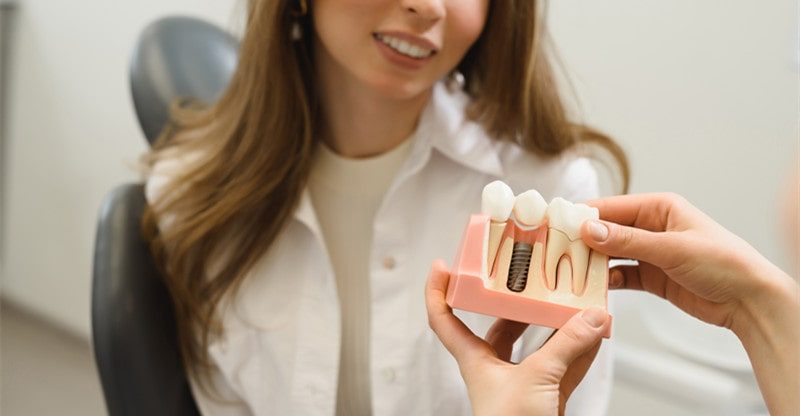Proper Care For Your Dental Implants And Overdentures
Oral health is as vital as any other aspect of your physical well-being. Another link to your oral well-being is dental hygiene. Together, good hygiene and the correct dental care practices foster a healthy mouth environment and your megawatt smile filled with healthy teeth. This philosophy applies to everyone, even if you have dental implants and overdentures.
What Are Dental Implants?
Dental implants are prosthetic devices that dental professionals use to replace missing teeth. They are typically made of titanium and are surgically placed into the jawbone to act as an anchor for artificial teeth. The implant fuses with the bone over time, creating a secure foundation for the replacement teeth.
Dental professionals often use dental implants to replace one or more missing teeth (in which case they are known as overdentures)or support dentures or bridges. The implant is a small metal post inserted into the jawbone. After the implant fuses with the bone, your dentist places an abutment (a connector piece) on top of the implant. The replacement teeth are attached to the abutment.
Implants are a popular option for tooth replacement because they look and function like natural teeth, are permanent and stable, help preserve the integrity of the jawbone, and do not require the reduction of adjacent healthy teeth.
The dental implant procedure is a multi-step process that typically involves several months of healing. It is essential to have good oral health and enough bone density to support the implant. Oral surgeons or periodontists typically perform the implantation.
However, while permanent replacement solutions, they still require proper care if they are to last and work as your dentist expects them to. Therefore, you must also know how to take care of dental implants and overdentures. Keep reading to find out how.
How To Care For Dental Implants
Proper care for dental implants and overdentures includes maintaining good oral hygiene, visiting your dentist regularly for check-ups and cleanings, and avoiding habits that can damage the implants or overdentures. However, there are also some type-specific habits to observe, based on whether you have overdentures or a single implant.
Care For Single Implants
This type has more straightforward care requirements than overdentures. They include:
- Brushing your teeth twice daily,for at least two minutes each time, using fluoride toothpaste and a soft-bristled brush (to avoid dislodging the implant).
- Opt for a nylon-coated interdental brush for better reach between teeth.
- Floss daily.
- Consider using an oral irrigator as an alternative to flossing.
Care For Overdentures
Overdentures require more specific care than singular implants. So, in this case:
- Remove them every day and leave them in a cleaning solution overnight.
- Inspect the connective rings and loops for any wear and tear or damage.
- Gently brush the underside of your overdentures using a soft-bristled brush before you place it in the cleaning solution.
- It is crucial to rinse your overdenture with water after soaking and before placing it in your mouth.
It is important to note that dental implant and overdenture care require a team effort between you and your dentist. Regular check-ups, cleanings and maintenance are essential to ensure the implant’s long-term success. Doing so can also help detect and prevent problems before they become severe.
In addition, you should avoid habits that can damage the implants or overdentures, such as biting or chewing on hard objects, grinding your teeth, and using tobacco products.
It’s also necessary to pay attention to any signs of complications such as implant or overdenture loosening, pain or discomfort, or changes in bite or speech. If you notice these symptoms, contact your dentist as soon as possible.



